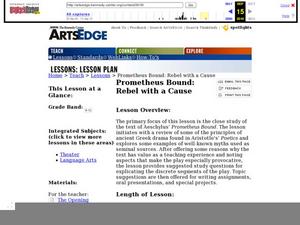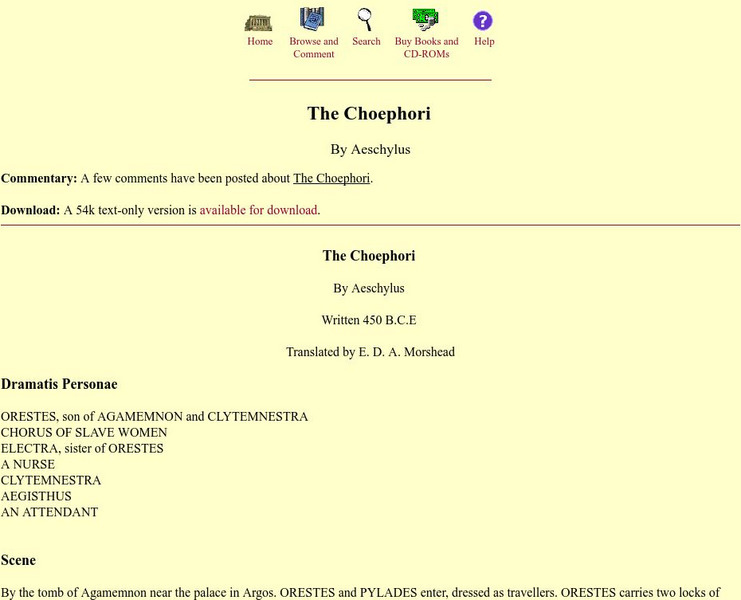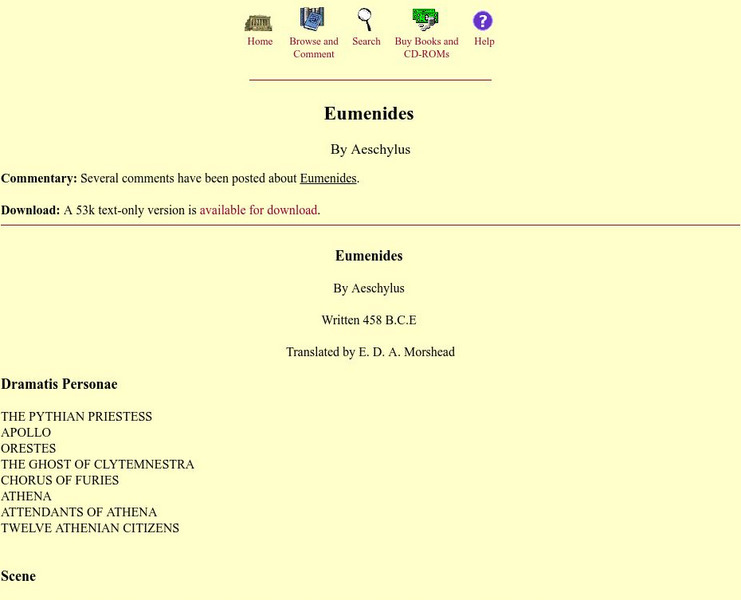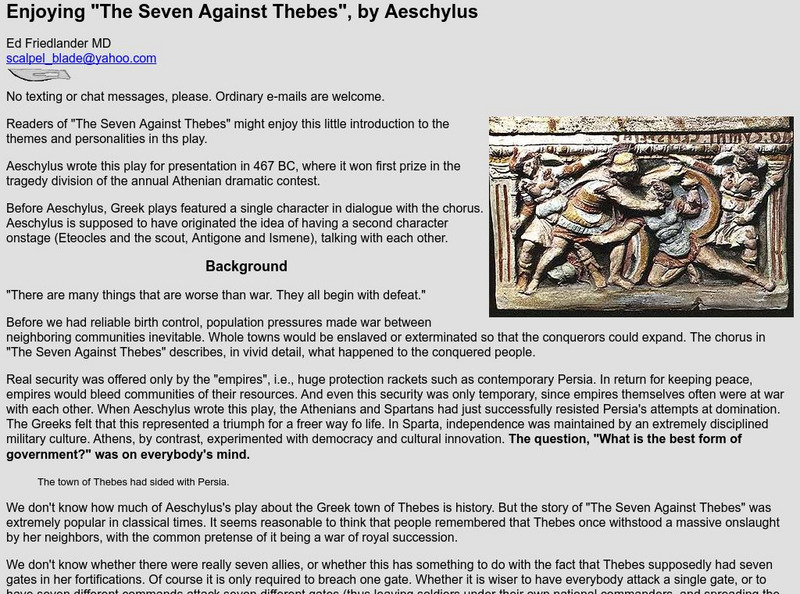Curated OER
Prometheus Bound: Rebel with a Cause
If you are teaching Aeschylus' Prometheus Bound, you can't afford to miss this source. An extensive list of ideas outlines numerous discussion topics, writing prompts, comprehension questions, oral presentations, and projects. Have class...
Curated OER
Geeky Greeks and Robust Romans: A Look at How a Few Folks a Few Thousand Years Ago Began a Few Trends
Have a blast comparing and contrasting ancient Greek and Roman cultures with this entertaining and educational powerpoint, which is as well-organized as it is thorough. Students will find the differences between the Greeks and Romans...
SparkNotes
The Libation Bearers by Aeschylus: Study Guide - Mini Essays
In this online interactive literature learning exercise, students respond to 10 short answer and essay questions about Aeschylus's The Libation Bearers. Students may check some of their answers online.
Curated OER
The Libation Bearers
In this online interactive reading comprehension worksheet, students respond to 25 multiple choice questions about Aeschylus's The Libation Bearers. Students may submit their answers to be scored.
Other
Pathguy: "Enjoying Prometheus Bound" by Aeschylus
Detailed analysis of "Prometheus Bound" a play by Aeschylus. Includes excerpts, pictures, and excellent sources.
Massachusetts Institute of Technology
Mit: Internet Classics Archive: The Choephori
MIT's Internet Classics Archive offers a complete text of The Choephori, or The Libation Bearers, by Aeschylus. This is the second play in the Oresteia trilogy.
Massachusetts Institute of Technology
Mit: Internet Classics Archive: Agamemnon, by Aeschylus
Aeschylus' famous play, Agamemnon, was written in 458 BCE. The full text available here provides an important perspective on the figure of Agmamemnon in ancient Greek culture.
Other
Alien Travel Guide: Aeschylus
This site briefly discusses the playwright and his contribution to the theater. Includes a picture of a mosaic depiction of Aeschylus.
HyperHistory Online
Hyper History Online: Aeschylus (525 456 Bc)
This is a short biography of Aeschylus, touching on his innovative play writing style.
Other
Monologue Archive: Monologues by Aeschylus
Choose a dramatic monologue from this classic playwright's works. Page includes links to biographical sketches, an index of articles about Aeschylus and the text of some poems.
Massachusetts Institute of Technology
Mit: Internet Classics Archive: The Persians by Aeschylus
This MIT Internet Classics Archives page is a translation of "The Persians" in an easy-to-read format, maintaining the verse format of the original.
Massachusetts Institute of Technology
Mit: Internet Classics Archive: Eumenides
MIT's Internet Classics Archive offers a complete text of "The Eumenides" or "The Furies" by Aeschylus. This is the final play in the Oresteia trilogy.
Other
Enjoying "The Seven Against Thebes"
Detailed analysis of "The Seven Against Thebes" a Greek play by Aeschylus. Includes the background of the play, excerpts, pictures, and a catalogue of "the gods" from the play,.
Able Media
Ctc: Gods, Grief and Freedom in Aeschylus' Oresteia
Refers to the underlying theme of Greek tragedies as mere mortals worrying about their actions.
Other
Theatre and Drama in Ancient Greece
Brief description of how societal traditions developed into theater in Ancient Greece. Includes well-known playwrights and plays as well as links to comprehensive information within and outside of the site.
Massachusetts Institute of Technology
Mit: Internet Classics Archive: Medea (Euripides)
MIT offers an online version of the classical play "Medea" by the Greek playwright Euripides.
Curated OER
Educational Technology Clearinghouse: Clip Art Etc: Persona
A mask. Masks were worn by Greek and Roman actors in nearly all dramatic representations. This custom arose undoubtedly from the practice of smearing the face with certain juices and colours, and of appearing in disguise, at the...
Curated OER
Educational Technology Clearinghouse: Clip Art Etc: Persona
A mask. Masks were worn by Greek and Roman actors in nearly all dramatic representations. This custom arose undoubtedly from the practice of smearing the face with certain juices and colours, and of appearing in disguise, at the...















